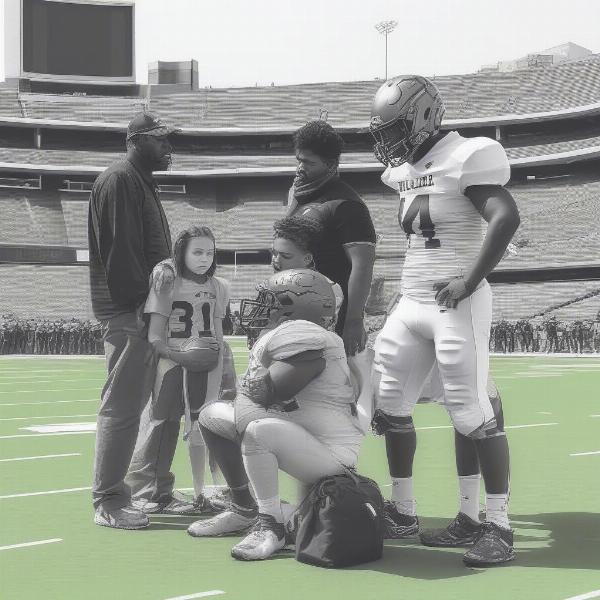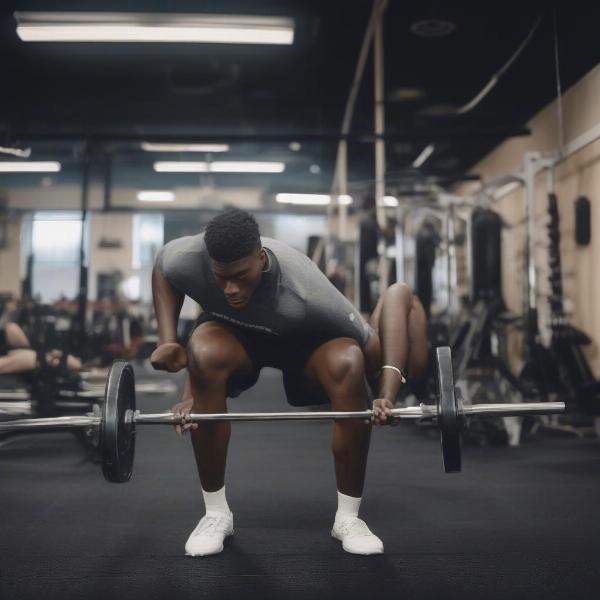Players opting out of bowl games has become increasingly common in college football. This phenomenon raises questions about the changing landscape of the sport and the motivations behind these decisions. Let’s delve into the various factors driving this trend.
The Rise of Opt-Outs: A Shifting Landscape
The decision to opt out of a bowl game, while once rare, is now a significant aspect of the college football season. Several converging factors contribute to this shift, impacting both individual players and the perception of bowl games themselves.
Financial Implications: Protecting Future Earnings
One of the most compelling reasons for opting out is the risk of injury. For players with NFL aspirations, a bowl game injury could jeopardize their draft prospects and potentially cost them millions of dollars in future earnings. The financial stakes are high, and protecting their future career takes precedence.
- Mitigating Risk: Bowl games, while celebratory, still carry the inherent risk of injury.
- Securing the Future: The potential for a lucrative NFL contract outweighs the immediate gratification of a bowl game victory.
- Changing Priorities: The focus has shifted from the traditional sentiment of playing every game to safeguarding long-term career prospects.
 College Football Player Opting Out Due to Injury Risk
College Football Player Opting Out Due to Injury Risk
The Evolving Bowl Game Landscape: A Diminished Significance?
The proliferation of bowl games has arguably diluted their prestige. With so many games now on the calendar, some argue that the significance of participating in one has diminished, particularly for teams outside the College Football Playoff.
- Too Many Bowls? The sheer number of bowl games raises questions about their overall importance.
- Focus on the Playoffs: The College Football Playoff has become the ultimate goal, overshadowing other bowl games.
- Lower Stakes: For many teams, a bowl game represents a pleasant end to the season, but not a must-win scenario.
The NFL Draft: A Looming Priority
The NFL Draft looms large for eligible players. The months leading up to the draft are crucial for training, showcasing skills, and impressing scouts. Participating in a bowl game can detract from this preparation and potentially impact draft positioning.
- Preparation is Key: Dedicated training and preparation are essential for maximizing draft potential.
- Showcase Opportunities: Players may choose to focus on individual workouts and combine preparation to impress NFL scouts.
- Draft Position Matters: Even a slight improvement in draft position can translate to significant financial gains.
 NFL Draft Preparation Over Bowl Game Participation
NFL Draft Preparation Over Bowl Game Participation
What Coaches and Fans Think: A Divided Perspective
The trend of opting out has generated mixed reactions. While many coaches and fans understand the rationale behind these decisions, others criticize players for prioritizing individual interests over team loyalty and tradition.
- Respecting Individual Decisions: Many acknowledge the player’s right to make the best decision for their future.
- Upholding Tradition: Some argue that participating in a bowl game is a commitment to the team and a valuable experience.
- Finding a Balance: The ongoing debate centers on finding a balance between individual aspirations and team unity.
The Future of Bowl Games: Adapting to Change
The opt-out trend necessitates a re-evaluation of the bowl game system. Maintaining the appeal and relevance of these games requires addressing the concerns of players and finding ways to incentivize participation.
- Enhanced Player Safety: Exploring ways to minimize injury risk in bowl games could encourage participation.
- Increased Financial Incentives: Offering greater financial rewards or insurance policies could mitigate the financial concerns of players.
- Elevating Prestige: Re-emphasizing the historical significance and prestige of certain bowl games could enhance their appeal.
 The Future of Bowl Games in College Football
The Future of Bowl Games in College Football
Why Players Choose to Sit Out Bowl Games: FAQs
Q1: Are players obligated to play in bowl games?
No, players are not contractually obligated to play in bowl games.
Q2: When did players start opting out of bowl games?
The trend began gaining momentum around 2016.
Q3: Do players who opt out still travel with the team to the bowl game?
This varies, some players choose to support their teammates while others focus on draft preparation.
Q4: Has the NCAA addressed the opt-out trend?
The NCAA has yet to implement formal policies regarding opt-outs.
Q5: How does opting out affect team morale?
The impact on team morale can vary depending on the team dynamics and the specific player involved.
Conclusion: Navigating the New Normal
Why Do Players Opt Out Of Bowl Games? The answer is multifaceted, encompassing financial considerations, career aspirations, and the evolving landscape of college football. Understanding these factors is crucial for navigating the new normal in the sport and ensuring the continued relevance of bowl games. The conversation surrounding opt-outs is likely to continue, prompting further discussion and potential changes within the college football system.

